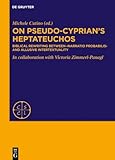On Pseudo-Cyprian’s Heptateuchos : Biblical Rewriting between 'narratio probabilis' and Allusive Intertextuality / Ps.-Cyprianus Gallus; Michele Cutino.
Material type: TextSeries: Corpus Scriptorum Ecclesiasticorum Latinorum ; [EXTRA SERIEM]Publisher: Berlin ; Boston : De Gruyter, [2023]Copyright date: ©2023Description: 1 online resource (X, 152 p.)Content type:
TextSeries: Corpus Scriptorum Ecclesiasticorum Latinorum ; [EXTRA SERIEM]Publisher: Berlin ; Boston : De Gruyter, [2023]Copyright date: ©2023Description: 1 online resource (X, 152 p.)Content type: - 9783111019529
- 9783111022277
- 230
- BR65.C85 H4737 2023
- online - DeGruyter
- Issued also in print.
| Item type | Current library | Call number | URL | Status | Notes | Barcode | |
|---|---|---|---|---|---|---|---|
 eBook
eBook
|
Biblioteca "Angelicum" Pont. Univ. S.Tommaso d'Aquino Nuvola online | online - DeGruyter (Browse shelf(Opens below)) | Online access | Not for loan (Accesso limitato) | Accesso per gli utenti autorizzati / Access for authorized users | (dgr)9783111022277 |
Frontmatter -- Introduction -- Table of Contents -- À la découverte d’un poème négligé : l’Exode de l’Heptateuchdichter -- Non-Epic Classical Poetry in the Heptateuchos Poem -- La création de la femme (Gen. 2,18–24) dans la paraphrase biblique de l’Heptateuchos (Cypr. Gall. gen. 32–37) -- Re-forging Balaam the Epic Way -- Bible and Intertext: An Inquiry into the Narrative Strategies in the Heptateuchos Poem -- Index
restricted access online access with authorization star
http://purl.org/coar/access_right/c_16ec
Though the Heptateuchos is possibly the most organic attempt at poetic rewriting of the Old Testament, attributed to “Cyprian the Gaul” by R. Peiper, the latest editor of the text in CSEL 23 (1891), we do not have a comprehensive analysis of this poem yet that can provide a clear grasp of the poem’s compositional logic, show which of its biblical model’s content was used, and expound the context and purpose of its versification. It is apparent that in many respects the Heptateuchos is still profoundly unknown. For this reason the UR 4377 of Catholic Theology and Religious Sciences of the University of Strasbourg, notably its ERCAM (“Équipe de recherches sur le christianisme antique et médiéval”), with its statutory members and its associate members, is engaged in the publication of a new critical edition of each of the seven books of the anonymous poem of uncertain date, the Heptateuchos, also providing an exhaustive commentary. The essays collected in this volume represent a preliminary work for the upcoming edition and commentary planned by the members of UR 4377 in Strasbourg. Above all, they show how the anonymous author was interested in safeguarding the criterion of the narratio probabilis in the poem, through probable references to Judeo-Hellenistic literature and by refining the exegetical reading of the text with references to classical and Christian poetry.
Issued also in print.
Mode of access: Internet via World Wide Web.
In Latin.
Description based on online resource; title from PDF title page (publisher's Web site, viewed 06. Mrz 2024)


